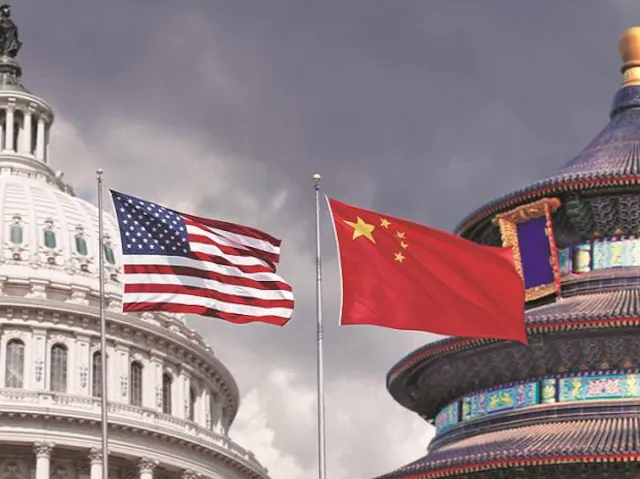China called the United States to claim that Beijing is the “most significant long-term danger to the world order” and a “typical piece of deception and a smear campaign.”

China blasted the United States depiction of Beijing as the “most significant long-term danger to the world order” as “typical deception and a smear campaign” on Friday.
Secretary of State Antony Blinken told a crowd at George Washington University in Washington, D.C., on Thursday that China is the only country with the desire to remake the international order and, increasingly, the economic, diplomatic, military, and military-technical power to do so.
He referred to China as “the most severe long-term risk to the world order”.
He stated that the United States, although stepping up rivalry with an “invest, align, compete” approach, will avoid confrontation or a new Cold War with the Communist country.
China slammed Blinken’s comments, calling them a typical case of deception and a smear campaign.
Secretary Blinken’s address is long and detailed. According to Chinese International Ministry spokesperson Wang Wenbin, he went to great efforts to propagate disinformation, play up the so-called “China threat,” intervene in China’s internal affairs and tarnish China’s domestic and foreign policies.
The primary goal is to keep China’s growth under control and retain U.S. hegemony. He stated that China condemns and opposes this.
Wang stated that international laws and order had been clearly defined. China has long maintained that all countries should resolutely preserve the global system centered on the United Nations.
Blinken highlighted his administration’s China policy, which includes developing a network of friends and partners, acting with a shared purpose and common cause, and referring to Washington’s attempts to strengthen ties with India and the recent Quad summit in Tokyo 40-minute address.
“We’re forming new alliances to serve our people and confront the century’s challenges ahead.” This is especially true in the Indo-Pacific area, where our ties, including treaty alliances, are among the strongest in the world.
Wang also aimed at the Quad, consisting of India, Japan, the United States, Australia, and AUKUS, a trilateral security treaty involving Australia, the United Kingdom, and the United States.
The creation of little cliques is reversing history. Creating tiny groups defies historical precedent. He claimed that the U.S. devised the so-called Indo-Pacific strategy to enlist the help of regional countries to limit China and that it now claims to be able to dictate the strategic environment around Beijing.
“This attempt to band together against China will have no support and is certain to fail,” Wang said.
Blinken has also made it clear that the U.S. does not want to stifle China’s rise as a global power or reform its political system, nor does it want to fight it.
“We are not searching for a new Cold War or confrontation.” On the contrary, Blinken stated, “we’re dead set on avoiding both.”
He stated that the U.S. is prepared to strengthen diplomacy and increase communication with China “across a broad range of issues” and that the two countries are willing to collaborate on issues of mutual interest such as climate change and Covid-19, noting that “even as we invest, align, and compete, or work together with Beijing, where our interests intersect,”
“We can’t let our differences keep us from advancing on the goals that need us to work together for the welfare of our people and the good of the globe,” Blinken added.
In his answer, Wang stated that China had taken note of Blinken’s declaration that the U.S. is not seeking war or a new Cold War with China; it does not wish to prevent China from playing a prominent role in the world and wants to coexist peacefully with China.
“We’re keeping an eye on what the U.S. does,” he added.
President Joe Biden reinforced the U.S.’ crucial security partnerships with South Korea and Japan during his visit to the area, according to Blinken, and increased economic and technological collaboration with both nations.
Biden introduced the Indo-Pacific Economic Framework (IPEF), a first-of-its-kind strategy.
It will, in the words of the President, “assist all of our countries’ economy is growing quicker and more fairly,” according to Blinken.
“The IPEF, as we call it,” he explained, “renews American economic leadership while adapting it for the twenty-first century by addressing cutting-edge challenges like the digital economy, supply chains, clean energy, infrastructure, and corruption.”
A dozen nations have already signed on, including India. IPEF members account for more than a third of the global economy, according to Blinken.
QUAD
The President also attended the Quad nations’ leaders’ conference.
It’s on its way to becoming a top regional squad. He added that it inaugurated a new Indo-Pacific Partnership for Marine Domain Awareness this week.
Our regional partners may better monitor the waters around their coastlines to combat illegal fishing and preserve their maritime rights and sovereignty.
We’re working to improve peace and stability in the Indo-Pacific; for example, the new AUKUS security alliance between Australia, the United Kingdom, and the United States. Blinken remarked.
The policy of the Biden administration would be “invest, align, compete,” he said, adding that while the U.S. does not desire war with China, it will protect its interests if necessary.
Blinken wanted to emphasize how “one of the most intricate and crucial partnerships that we have today” is the connection between Washington and Beijing.
Blinken underlined apparent disparities between the two nations.
He explained how the U.S. intended to handle that relationship, highlighting topics like China’s “repressive” leadership, unfair economic practices, and human rights violations.













